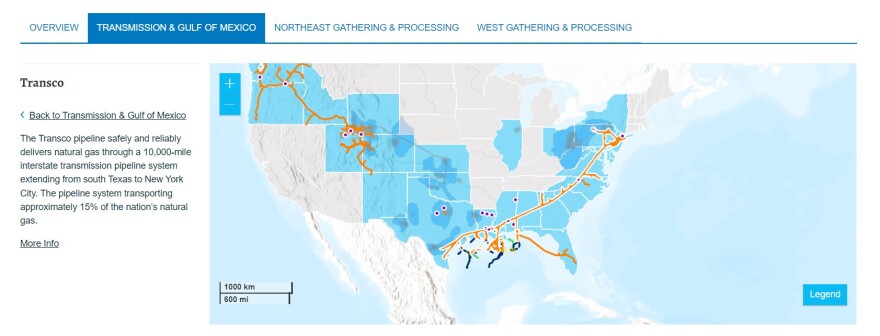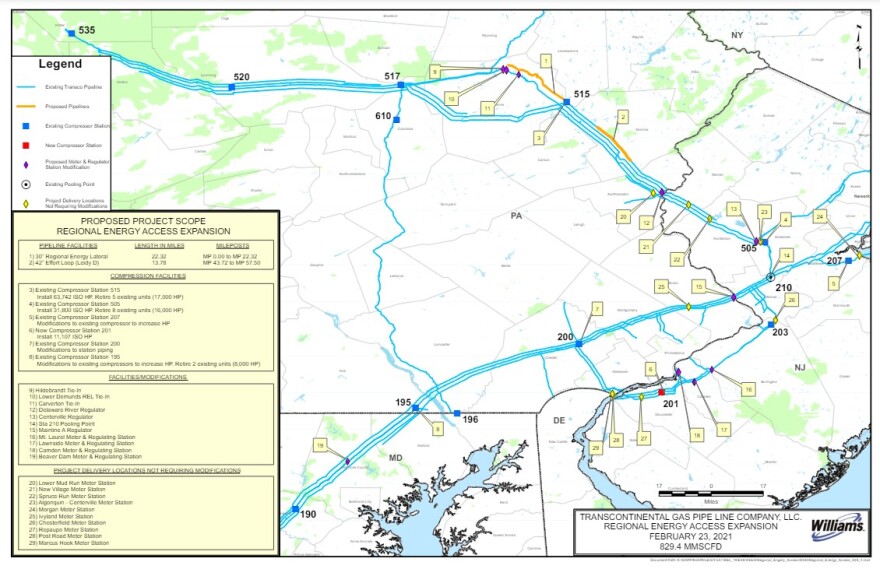BETHLEHEM, Pa. — When residents see pipelines criss-crossing the region, they have a tendency to respond with, “It’s part of the landscape,” or “It just is what it is,” Jessica O'Neill said.
“But this pipeline cuts across northern Pennsylvania counties, Monroe and Luzerne, where we have a lot of special protection waters,” said O’Neill, PennFuture’s managing attorney for litigation.
“We're cutting through some really high quality streams and wetlands across the Poconos. And anytime you make a cut there, anytime you impact those waterways, you're having a significant impact.”
PennFuture and the Delaware Riverkeeper Network this month realized a win in their case against the Transcontinental Gas Pipe Line Company, or Transco, and the state Department of Environmental Protection.
The U.S. Court of Appeals for the Third Circuit sided with the environmental groups, solidifying their ability to challenge permits issued for Transco’s Regional Energy Access Expansion Project to the state’s Environmental Hearing Board.
DEP and Transco unsuccessfully argued that only a federal court could hear challenges to the natural gas pipeline expansion project, citing the The Natural Gas Act.
The DEP issues the permit, you challenge the permit before the hearing board. That's sort of how it works in every other context, and so we think it's a really useful precedent for everybody to say and that's how it works here, too.Jessica O'Neill, PennFuture’s managing attorney for litigation
“We have a lot of pipelines in Pennsylvania, and we do see this industry expanding,” O’Neill said.
“I think [the ruling] is useful, as we will see other natural gas, other fracked gas and pipeline infrastructure attempt to be built, seek permits, and it's good for everyone to know where a challenge to this permit is going to occur.
“And we think it's rightfully before the hearing board. The DEP issues the permit, you challenge the permit before the hearing board. That's sort of how it works in every other context, and so we think it's a really useful precedent for everybody to say and that's how it works here, too.”
Asked for comment, a Transco spokesperson said, “We continue to expect the Regional Energy Access project to be completed on schedule.”
‘The longest pipeline in the world’
Residents of the Lehigh Valley and beyond are probably familiar with the Transco pipeline — a 10,000-mile pipeline that carries natural gas from south Texas to New York and New Jersey.
Owned by Texas-based Williams Companies, the pipeline has been part of the northeastern Pennsylvania landscape for decades.

“This infrastructure network transports about 16% of the natural gas consumed in the U.S., making it the largest of four interstate pipelines operated by Williams,” according to the company’s website.
“When the Transco pipeline was placed into service in 1949, it was touted as the longest pipeline in the world and the largest single-project construction venture ever attempted.”
The Regional Energy Access Expansion is exactly what the name implies — the project focuses on expanding capacity in the northeast.
It's among at least two Transco pipeline projects underway in the commonwealth. The other is the Leidy South Project.

The REAE project includes adding “new pipelines, a new gas-fired turbine driven compressor station, addition of gas-fired turbine driven compressor units at existing compressor stations [and] modification and uprate of existing compressors," according to an information sheet published Feb. 2023 by the DEP.
Also, "abandonment of existing gas-fired compressors, modifications to existing compressor stations, modifications to existing pipeline tie-ins, addition of regulation controls at an existing valve setting and modifications to existing regulators.”
Extensions underway
Extensions are underway in Monroe and Luzerne counties, 13.8 miles and 22.3 miles, respectively, and a regulator, called the “Delaware River Regulator,” is earmarked to be built in Northampton County.
Work is scheduled to be completed by the "2024 winter heating season," company officials said.
The project supports the broader goal of meeting the growing regional demand for cost-effective, clean and reliable natural gas.Transco
"The project supports the broader goal of meeting the growing regional demand for cost-effective, clean and reliable natural gas," according to the company's website.
"Further, the project will be constructed in a manner that is adaptable to future renewable energy sources like clean hydrogen and [renewable natural gas] blending, thereby providing the necessary and critical infrastructure needed to meet clean energy demand for generations to come."
The project extends across three DEP regions and more than a half dozen counties — Luzerne, Monroe and Northampton in the northeast; Bucks, Chester and Delaware in the southeast; and York County in DEP’s southcentral region.
However, officials said the project will not require earth disturbance in Delaware and York counties.
‘Disagreed with them and agreed with us’
Soon after the DEP issued permits for the expansion project, PennFuture and the Riverkeepers challenged them, bringing the issue before the state Environmental Hearing Board.
“That's the body that hears challenges to these kinds of permits,” O’Neill said. “This is a thing that they regularly do, and organizations like ours regularly challenge permits like this because we think that they're not protective enough of our natural resources.”
But officials at Transco and the DEP didn’t agree on the venue. Instead, they argued any challenge should be heard by the Third Circuit due to the Natural Gas Act, which outlines a federal process for challenging pipelines.
"We think that the state hearing board is the best place to look at these permits. And to see if these permits do what they're supposed to do under our state Clean Streams law, and if they are appropriately protective of the state natural resources.”<br/>Jessica O'Neill, PennFuture’s managing attorney for litigation
“The Third Circuit disagreed with them and agreed with us and said, ‘No, the state Environmental Hearing Board has the authority to hear challenges to these permits, and nothing in the Natural Gas Act or other federal law preempts the state hearing board from hearing this challenge,’” O’Neill said.
“And that's really important to us because we think that the state hearing board is the best place to look at these permits.
“And to see if these permits do what they're supposed to do under our state Clean Streams law, and if they are appropriately protective of the state natural resources.”
Maya van Rossum, leader of the Delaware Riverkeeper Network, said, “It was quite disturbing that the [state] DEP sought to strip its own state Environmental Hearing Board of legal authority over permit decisions.”
'Sided with the people'
Van Rossum said in a news release announcing the decision that, “Unfortunately, when it comes to natural gas pipelines, it is common that environmental organizations like the Delaware Riverkeeper Network and PennFuture don’t just have to face down the monumental financial and legal resources of the pipeline companies themselves, but routinely the state government and the federal government sides with the pipeline companies against the people.
“In short, this victory validates and secures the rights of impacted communities to challenge state issued approvals to natural gas pipelines through their own state’s administrative appeals process.”Maya van Rossum, leader of the Delaware Riverkeeper Network
"But in this case, the courts have rightly sided with the people. In short, this victory validates and secures the rights of impacted communities to challenge state issued approvals to natural gas pipelines through their own state’s administrative appeals process.”
The recent court decision isn’t the only loss with which Transco has dealt this year.
In May, company officials announced they wouldn’t move forward with the Northeast Supply Enhancement, or NESE, pipeline, according to the Institute for Energy Economic and Financial Analysis.
The pipeline was planned to stretch from Pennsylvania and through New Jersey to a transfer point in Queens, New York.
The company let a construction extension, granted by the Federal Energy Regulatory Commission, lapse after environmental advocates and civic leaders “warned the project was not necessary to meet peak demand.”
Trial date set
Although that case is settled, the original permit challenge continues.
“Transco, through this federal litigation, attempted to stop the hearing board litigation,” O’Neill said. “But no court ever stayed the hearing board litigation. So, we've been proceeding with that the whole time.
“We did discovery. We exchanged documents. We took depositions. And now, we're going to trial in September.”
“That process might take a little while. I don't really know how long we might have to wait to get an opinion after the hearing.”Jessica O’Neill, PennFuture’s managing attorney for litigation
The trial is scheduled for 10 a.m. Sept. 16 before Judge Bernard A. Labuskes Jr. at the hearing board’s office in the Rachel Carson State Office Building, 400 Market St., Harrisburg, according to court filings.
PennFuture and the Riverkeepers plan to argue that the permits issued by the DEP were flawed.
“This construction will damage 114 exceptional Value wetlands, 77 bodies of water supporting cold water fisheries, 39 high quality streams, two exceptional Value streams, 17 Class A wild trout streams, 57 waterbodies with naturally reproducing trout and 297 acres of forests,” officials said previously.
The trial is expected to take a week. Then, attorneys for both sides will file post-hearing briefs. While one judge leads the hearing, the entire board issues an opinion — if there’s a consensus.
“That process might take a little while,” O’Neill said. “I don't really know how long we might have to wait to get an opinion after the hearing.”
If the board sides with PennFuture and the Riverkeepers, there could be several outcomes.
“The EHB could say these permits were issued in error,” she said. “They could remand them back to the department to issue permits with different conditions on them.
"They could remand him back to the department to require additional mitigation of impacts or additional work by Transco to kind of clean up or better restore the areas that it has disturbed.
“They've got a lot of discretion there.”


